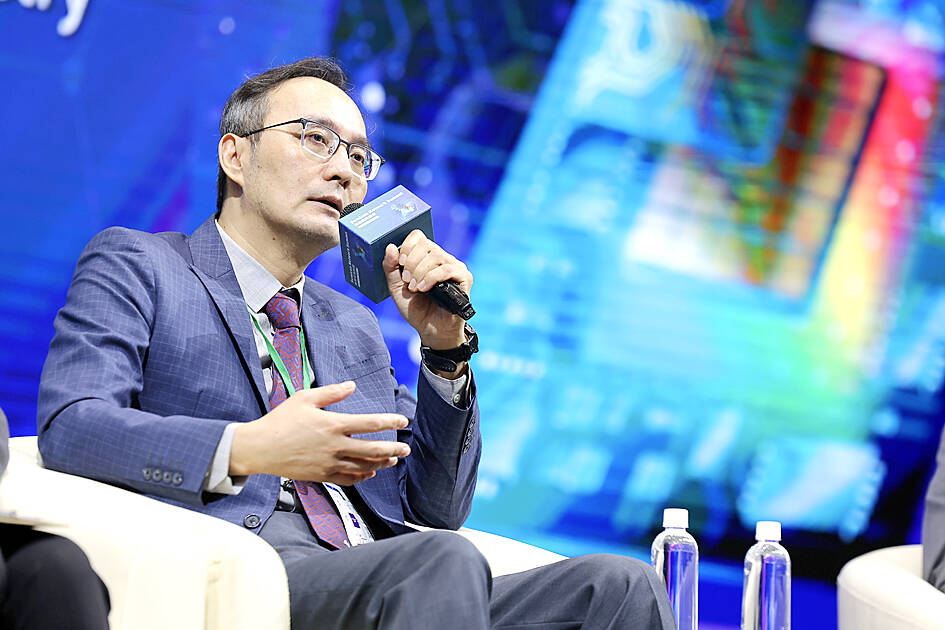MediaTek Inc (聯發科), Taiwan’s largest chip designer, yesterday said that it has adopted Taiwan Semiconductor Manufacturing Co’s (TSMC, 台積電) advanced 2-nanometer process to build its next flagship system-on-a-chip (SoC).
The SoC has completed the tape-out stage, in which the final design is sent for manufacturing preparation, and is expected to enter mass production in the second half of this year and be available at the end of next year, MediaTek said in a statement.
Although the company did not reveal the chip’s name, international media reported it could be the Dimensity 9600, MediaTek’s next-generation mobile flagship SoC, as part of its strategy to cement its global position in cutting-edge semiconductor technologies.

Photo: CNA
MediaTek president Joe Chen (陳冠州) said the company’s partnership with TSMC has enabled its flagship chips to deliver highly efficient performance and provide solutions across products ranging from edge applications to cloud services.
MediaTek and TSMC have long collaborated on mobile platforms, computing, automotive electronics and data centers, the chip designer said.
The new SoC highlights the strength of their relationship, it added.
TSMC deputy co-chief operating officer and senior vice president of business development and global sales Kevin Zhang (張曉強) said the 2-nanometer process marks TSMC’s entry into nanosheet transistor architecture, underscoring its commitment to meeting customer demand by upgrading technologies, and enhancing computing performance and energy efficiency.
The partnership with MediaTek reflects TSMC’s ambition to support a broad range of applications, Zhang added.
MediaTek is among several companies adopting TSMC’s 2-nanometer process. Other prominent customers — including Apple Inc, Nvidia Corp and Advanced Micro Devices Inc — are also expected to release products built with the technology.
The 2-nanometer process would be the world’s most advanced in density and energy efficiency, offering full-node improvements in performance and power consumption, TSMC said on its Web site.

Nvidia Corp chief executive officer Jensen Huang (黃仁勳) on Monday introduced the company’s latest supercomputer platform, featuring six new chips made by Taiwan Semiconductor Manufacturing Co (TSMC, 台積電), saying that it is now “in full production.” “If Vera Rubin is going to be in time for this year, it must be in production by now, and so, today I can tell you that Vera Rubin is in full production,” Huang said during his keynote speech at CES in Las Vegas. The rollout of six concurrent chips for Vera Rubin — the company’s next-generation artificial intelligence (AI) computing platform — marks a strategic

REVENUE PERFORMANCE: Cloud and network products, and electronic components saw strong increases, while smart consumer electronics and computing products fell Hon Hai Precision Industry Co (鴻海精密) yesterday posted 26.51 percent quarterly growth in revenue for last quarter to NT$2.6 trillion (US$82.44 billion), the strongest on record for the period and above expectations, but the company forecast a slight revenue dip this quarter due to seasonal factors. On an annual basis, revenue last quarter grew 22.07 percent, the company said. Analysts on average estimated about NT$2.4 trillion increase. Hon Hai, which assembles servers for Nvidia Corp and iPhones for Apple Inc, is expanding its capacity in the US, adding artificial intelligence (AI) server production in Wisconsin and Texas, where it operates established campuses. This

US President Donald Trump on Friday blocked US photonics firm HieFo Corp’s US$3 million acquisition of assets in New Jersey-based aerospace and defense specialist Emcore Corp, citing national security and China-related concerns. In an order released by the White House, Trump said HieFo was “controlled by a citizen of the People’s Republic of China” and that its 2024 acquisition of Emcore’s businesses led the US president to believe that it might “take action that threatens to impair the national security of the United States.” The order did not name the person or detail Trump’s concerns. “The Transaction is hereby prohibited,”

Garment maker Makalot Industrial Co (聚陽) yesterday reported lower-than-expected fourth-quarter revenue of NT$7.93 billion (US$251.44 million), down 9.48 percent from NT$8.76 billion a year earlier. On a quarterly basis, revenue fell 10.83 percent from NT$8.89 billion, company data showed. The figure was also lower than market expectations of NT$8.05 billion, according to data compiled by Yuanta Securities Investment and Consulting Co (元大投顧), which had projected NT$8.22 billion. Makalot’s revenue this quarter would likely increase by a mid-teens percentage as the industry is entering its high season, Yuanta said. Overall, Makalot’s revenue last year totaled NT$34.43 billion, down 3.08 percent from its record NT$35.52